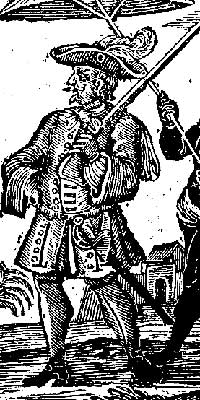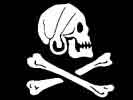 |
John
Avery, Long Ben, Benjamin Bridgeman, are just some of his
aliases. By all accounts Every was the most highly renowned
pirate of his time. Books and plays were written about his
life (or what many supposed it to be in their romanticized
way). Yet for all his celebrity and the uncertainty some accounts,
most sources say that he died in poverty.
The
first accounts of Henry Every, the 'arch pirate' was born
in the west of England near Plymouth in Devonshire. His early
life seems to have been spent at sea on a variety of merchantmen.
Differing
accounts place him as a Royal Navy tar at the bombardment
of the pirate base in Algiers in 1671, as a buccaneer on the
Spanish Main, as a logwood freighter captain in the Bay of
Campeachy, as a pirate in 1691 and 1692 under Captain 'Red
Hand' Nicholls and definitely as a truly underhanded slaver
employed by the Governor of Bermuda along the African Guinea
coast. In June of 1694 he was first mate aboard a private
ship of 46 guns being outfitted by some Bristol merchant to
harass French shipping in New Spain at the request of the
Spanish government. The ship's name seems to have been the
Charles II (or the Duke by other |
| accounts);
its captain was a notorious drunk. One evening as the captain,
Captain Gibson, lay sleeping off his latest bout with rum,
Every and several confederates slipped out of the Spanish
port of La Coruna and set sail with the purpose of pursuing
a career of piracy.
Every and crew set sail for Madagascar
with the intent to make their fortunes at the expense of others.
Along the way they plundered three British ships off the Cape
Verde Islands, captured a French privateer near the island
of Johanna along with loot taken from the Moors. It was here
at Johanna that Every wrote his famous letter.
To All English Commanders.
Let
this satisfy that I was riding here at this instant in the
Fancy, man-of-war, formerly the Charles of the Spanish expedition
who departed from La Coruna 7th May 1694, being then and now
a ship of 46 guns, 150 men, and bound to seek our fortunes.
I have never yet wronged any English or Dutch, or ever intend
whilst I am commander. Wherefore as I commonly speak with
all ships I desire whoever comes to the perusal of this to
take this signal, that if you or any whom you may inform are
desirous to know what we are at a distance, then make your
ancient [ship's flag] up in a ball or bundle and hoist him
at the mizzen peak, the mizzen being furled. I shall answer
with the same, and never molest you, for my men are hungry,
stout, and resolute, and should they exceed my desire I cannot
help myself. As yet an Englishman's friend, here are 160 odd
French armed men at Mohilla who waits the opportunity of getting
any ship, take care of yourselves.
At
Johanna, 18th February 1695- Henry Every
Arriving off the Arabian coast, and
joined by 5 other pirate vessels (including 4 from the American
colonies) the small fleet ran across one of the Great Mogul's
ships, the Gang-i-Sawai and its escort the Fateh Mohamed.
The Fateh Mohamed put up little fight and yielded about 50,000.
The Gang-i-Sawai sailed with only one escort as it was a vast
62 gun ship carrying 400-500 musketeers and 600 passengers.
A variety of luck helped Every as one of the Gang-i-Sawai's
guns exploded on the first salvo, followed shortly by one
of Every's guns snapping the great ship's mainmast. Through
lack of leadership or the fierceness of the pirates, the Indian
ship surrendered after a two hour pitched battle on its deck.
The pirates proceeded to brutalize and rape the passengers.
The treasure aboard the ship was the
stuff of pirate dreams, 500,000 pieces of silver and gold,
jewels, a saddle set with rubies meant as a gift for the Great
Mogul. When the pirates finished plundering the ships they
set them adrift, but without the surviving women. The Indian
ships eventually made their way to Surat, but the fate of
the women is unknown, most likely they were thrown overboard
or put ashore at Reunion, where the pirates put in to share
out the plunder. Estimates of the treasure put the value at
between 325,000 and 600,000, of which each pirate's share
was more than 1,000 (Every got two shares as captain).
Every's
fleet split up at this point with Every's band heading eventually
to St. Thomas to further fatten their purses by selling off
some of the various cargo. At the Bahamas, the pirates showered
the governor with gifts and bribes to the tune of some 7,000,
even going so far as to give him the Fancy. Unfortunately,
the attack on the Gang-i-Sawai had settled badly with the
Great Mogul and he cut off all trade with the East India Company
until they made reparations and put a 500 bounty on all of
Every's band. The result being that they were not welcome
in the West Indies or any of the British colonies.
Purchasing a small sloop the remaining
crew and Every (who now changed his name to Benjamin Bridgeman)
made their way back to Ireland. All told 24 of the crew were
arrested of which six were hanged. Every slipped away, and
some say he retired from piracy a wealthy man living in a
life of luxury. It is also told that he tried to sell off
his share of the treasure, mostly in diamonds, only to be
cheated by the merchants he was dealing with. The result being
that he was soon reduced to begging for food and dying without
the price of a coffin. Whether he died rich or poor it is
certain that the taking of the Gang-i-Sawai and Every's resulting
celebrity inspired quite a few to turn to a life of piracy.
|


